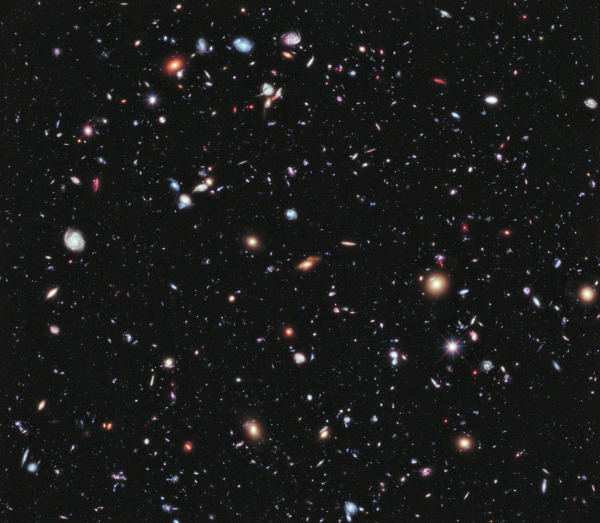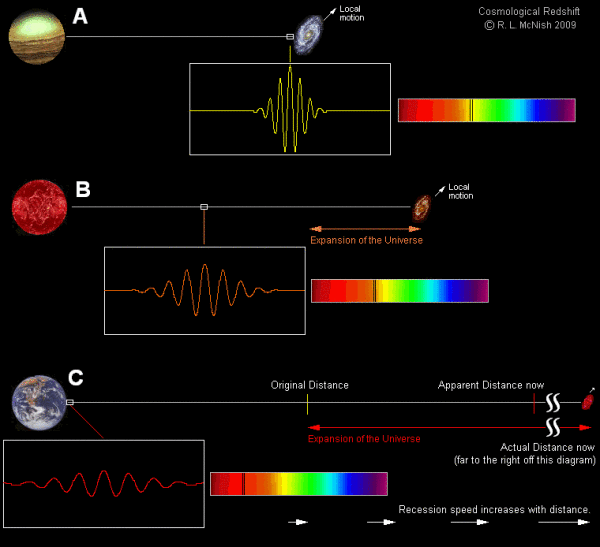“What is that feeling when you’re driving away from people and they recede on the plain till you see their specks dispersing? — it’s the too-huge world vaulting us, and it’s good-bye. But we lean forward to the next crazy venture beneath the skies.” -Jack Kerouac
But how do you say goodbye to a galaxy that will never receive your message? As it turns out, that's 97% of the galaxies in our Universe!
 Image credit: NASA; ESA; G. Illingworth, D. Magee, and P. Oesch, University of California, Santa Cruz; R. Bouwens, Leiden University; and the HUDF09 Team.
Image credit: NASA; ESA; G. Illingworth, D. Magee, and P. Oesch, University of California, Santa Cruz; R. Bouwens, Leiden University; and the HUDF09 Team.
While we might still be able to see the light from them for now, the light we're emitting right now will never reach them, and the light they're emitting right now will never reach us, either!
So what does it all mean, physically, to have these galaxies escaping from our view?
 Image credit: Larry McNish of RASC Calgary Center, via http://calgary.rasc.ca/redshift.htm.
Image credit: Larry McNish of RASC Calgary Center, via http://calgary.rasc.ca/redshift.htm.
Come find out on the first Ask Ethan of the new year!

"Or would we live in a case right on the border, where a single additional atom would recollapse the Universe (...)" - it may be a very naïve reasoning, but I like to think that if we discovered that we live in the critical Universe, that would be a proof that time travel isn't happening. At least it isn't happening as pictured in "Time Machine" and similar stories. After all each time travel should affect the mass of the Universe (particles disappear at one point of time and reappear at another).
Would this be like an invisible mass or an invisible energy even seeing as they one n same. Would this be a mass that's there in influence but not there physically? As its a mass I suppose it would exert a gravitational force of some sort? Sounds familiar lol
Ethan:
In the image from the Cosmic Perspective, the curves leading up to the present are very different between the first two scenarios, the third, and the fourth. Is there are reason we couldn't look at the rate of expansion of the universe in the past, and depending on whether the curve is logarithmic, linear, or exponential, make a logical deduction on its future course? I understand that dark energy is unpredictable, but given the past behavior and momentum going into the future, couldn't we make a meaningful prediction going forward based on what we see?
Thanks as always for the thought-provoking content,
Kevin
The math about light and time in the article could imply that we are just inside a really large black hole. Is there some factor that negates this explanation?
I have been pondering about something for some time.
Looking at things from a photons point of view, they are going at the speed of light, now according to Einsteins equations of time dilatation, from the perspective of the photon, doesn't it instantaneously get from it's source to it's destination as if it was hopping from one atom to another instantaneously?
does that make the following quote from the article untrue?:
"After spending billions upon billions of years traveling on a photon’s lonely journey through the expanding space separating us, it finally arrives at our eyes. "
Thanks for pointing out the difference between light originating long time ago and light originating now. This is usually not explained in most articles that talk about expanding universe. Very clearly written. Thanks.
-kvh
Where is the center? For some time, given the disposition of matter, I refuse to believe in a single big bang that started the universe. The article assumes that planet earth is the center of the universe. Isn’t it just as likely that gravity is wining all the time and that several locations in the universe have enough matter to pull toward a center, with no need to create a term that currently has no evidence(dark energy). I’m certainly not an expert in the field, so I would like to hear if and why I am wrong.
That must be the most low-key book announcement ever! Looking forward to it.
I prefer the idea of eternal inflation than the standard Big Bang theory. With eternal inflation, not only is new space emerging, so is new matter. And that just continues forever. At least as I understand it.
Why I like this better is that it seems fully compatible with my favorite theory: randomness at the heart of reality. I wish more people would pick up on that theory. As a computer scientist it makes perfect sense. Ultimately as we compress information , the result becomes uncompressable and more random. The more random the data set the less it can be compressed, giving way to this idea. That our very reality emerges out of randomness at the most fundamental level. From there emerges chaos theory and islands of stability and particles that persist enough to start building up our world.
Have you heard of this theory? Of randomness at the heart of reality? I forget the names of the authors who first wrote of it but I also haven't seen any other papers that have followed up on it. Well except for those from quantum theorists that seem to be bumping up against this same idea seemingly without recognizing it.
What are your thoughts?
@Eric Vincent #7: There is no center. If you take nothing else away from Ethan's excellent series of blogs, please take this away. The "Big Bang" was not an "explosion." It had, and has, NO CENTER.
The expansion of the Universe is a continuous increase in the "scale factor" of space: Any two nearby points, *anywhere* in the Universe, will become farther apart as time passes. The scale factor tells how much farther apart those two points are, compared to a time in the past when (arbitrarily!) you set the scale factor to unity.
So every three years a galaxy that is currently very, very red and dim will disappear altogether. But at what rate are galaxies that are currently reachable (part of the 3%) becoming unreachable (but still visible, presumably for a long time)? And is it possible to calculate, for a given maximum speed of travel less than the speed of light, how many are still reachable and how many are unreachable (at that speed)? If anyone can do these calculations, here's a question I'm interested in: how long do we have to develop propulsion at 0.15c before anything outside the Virgo supercluster is forever unreachable at those speeds?
There is another theory that our universe is decaying, and instead of expanding at a faster rate we see time slowing down which has the same red shift for speeding up.
Time has an end, where we can expect a big crunch instead of the universe expanding forever.